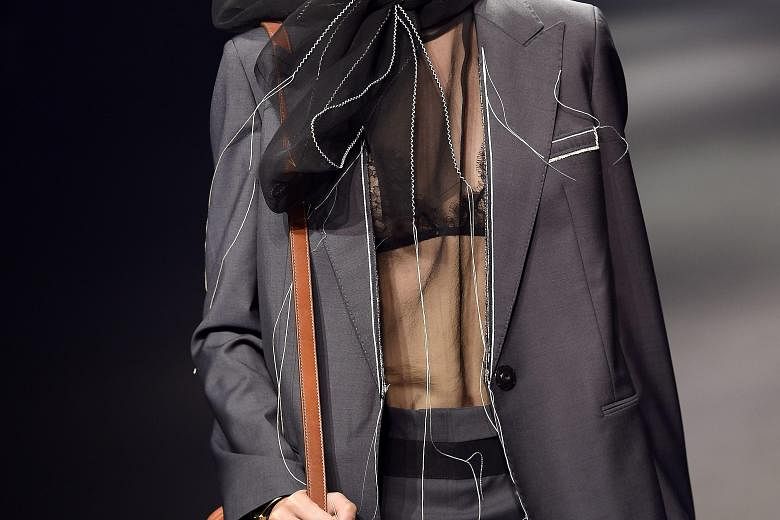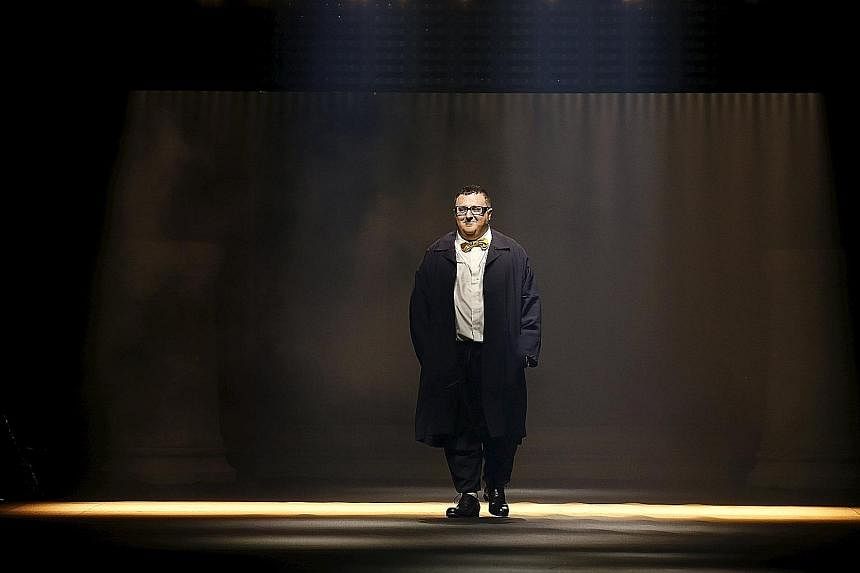NEW YORK • Even in a world inured to designer change, no one expected this.
Not the editors, retailers and friends who sat front row at the Lanvin womenswear show in Paris in October, applauding the crisp tuxedo day looks and the shimmering cocktail frocks.
Not Fashion Group International, which bestowed upon Alber Elbaz, the Lanvin artistic director, its Superstar Award three weeks later. And not Lanvin's own employees, many of whom cried when they got the news.
No one expected on a Wednesday morning in late October that Elbaz would be sitting at his home in Paris, reading a letter from Lanvin telling him not to come into the office because he had been fired.
And not long after, Lanvin, the oldest French fashion house in continuous existence, was in court, engaged in a very public airing of its dirty laundry.
"The company is breaking up into two camps: the management on one side, the works council, the studio and the ateliers on the other," said a recently dismissed manager who would speak only on condition of anonymity.
In the Tribunal de Grande Instance in Paris last Wednesday, Judge Penelope Postel-Vinay ruled on an emergency procedure brought by management.
Lanvin executives had accused the Comite d'Entreprise, a works council that functions as an intermediary between employees and executives, of abusing the internal communications network, fomenting unrest since Elbaz's departure and groundlessly alerting the board of directors to concerns about the company situation, especially its financial situation.
The executives asked that such actions be halted.
The judge found that the works council had behaved within its rights on the first two points and that the court did not have jurisdiction to suspend the right to alert.
She fined the company €3,000 (S$4,600) and instructed it to pay all legal fees for the works council, although she did not grant the €20,000 in damages it had requested. Both sides claimed a measure of victory.
Elbaz and Lanvin executives declined to be interviewed. But the situation at Lanvin has lifted the mink-trimmed, silk charmeuse skirt of fashion.
"Everyone should pay attention," said Mr Ralph Toledano, chief executive of Puig fashion division who, as the former chief executive of Guy Laroche, took Elbaz to Paris from New York in 1996. "It is a story of exactly what should not be done."
There is a truism in the fashion world that the most successful companies are built on a designer- chief executive pairing: Mr Pierre Berge and Yves Saint Laurent, Valentino and Mr Giancarlo Giammetti.
This evolved, as fashion industrialised and globalised, into a team of creative director and chief executive officer (think Tom Ford and Mr Domenico de Sole), watched over by a majority shareholder.
That was how Lanvin's once- upon-a-time began.
The fairy godmother was Ms Wang Shaw-lan, a Taiwan- based China-born former media mogul, who was part of a consortium that bought the then largely wholesale menswear and fragrance business of Jeanne Lanvin from L'Oreal in 2001.
That was when Elbaz, former creative director of Yves Saint Laurent, asked for a meeting. It is time to "awake the sleeping beauty", Ms Wang told Elbaz, according to a 2009 profile in The New Yorker. She cast him as her prince.
By the second season, he began to establish the signatures that became trademarks of the house (as well as inspiring multiple copycats), from exposed zippers in the back to grosgrain ribbon trim and a love of what Ms Virginia Smith, the Vogue market director, fashion and accessories, called "a sense of imperfect beauty; the appreciation of the humanity found in a frayed edge".
Mr Paul Deneve, president of Nina Ricci, joined as managing director in 2006 (previously Ms Wang's son had held that position) and they began to build the business.
Mr Bruno Frisoni, creative director of Roger Vivier, who worked with Elbaz during two seasons at Yves Saint Laurent, said the designer "is exhausting to work with". "He never agrees to anything until the last minute because of his level of perfectionism and passion," Mr Frisoni said.
Yet, the intensity was balanced by a "humanity", he added.
Elbaz was famous for sending flowers on birthdays, births of babies and after funerals.
In 2007, reportedly without telling Mr Deneve of her plans, Ms Wang sold the perfume business to Interparfums. In January 2009, Mr Deneve left - after "diverging opinions". It was the beginning of a pattern.
His replacement, Mr Thierry Andretta, former chief executive of Moschino, doubled the revenues in four years from approximately €120 million to about €240 million, before leaving in 2013 for "personal reasons" widely attributed to disagreements over strategy.
And although for years they seemed to have a warm relationship, developing a famous routine in which at the end of every show, Elbaz would bow to Ms Wang personally and she would give him a kiss and a bouquet of flowers, now he, too, is gone.
Over the years, the disagreements all seemed to turn broadly on the same point: Ms Wang's alleged reluctance to invest in the business, whether by putting cash back into the company after selling off assets or opening it up to outside investment.
Although she accepted a silent minority shareholder in Arpege, the company that owns Lanvin, in the form of German investor Ralph Bartel in 2009 (he now owns 25 per cent), and gave Elbaz some shares in her own Luxembourg-based holding company, Bluewater Investment (reportedly the indirect owner of Arpege), she maintained a tight hold on Lanvin.
"Everyone tried to buy it,"
Mr Andretta said. "She simply refused. In her way, she is very passionate about the company."
Mr Charles-Henry Paradis, a member of the communications team and the representative of the employees on the works council, said: "She is a very proud woman. She would see selling as an admission of failure."
Mr Andretta's successor was Ms Michele Huiban, the former finance chief.
Revenue and net profit fell in 2013 and last year. And according to an internal announcement, there was a loss of €2.5 million in net profits projected for this year - the first since 2007.
Lawyers for Lanvin disputed claims that this was an issue in court.
In a letter written to both the management and employees, Elbaz said it was a lack of an articulated strategy and investment that was responsible for the stagnation, a view supported by many employees, Mr Paradis said.
Lanvin executives allege that Elbaz tried to sell his shares in Bluewater without telling Ms Wang and then pressured her to sell her own holdings.
At the last show, she and Elbaz did not exchange their customary kiss, despite the fact that many retailers thought it was his best show in seasons.
The question is: What happens now?
Ironically, celebrities have been wearing the brand on the red carpet at an almost unprecedented rate, with actresses Cate Blanchett, Michelle Dockery and Meryl Streep and singer Adele all modelling Lanvin in public in the weeks since Elbaz's ouster.
The works council believes the company could owe Elbaz from €20 million to €40 million in severance, a figure denied by the Lanvin lawyers.
In terms of perception, "the company lost half its value when Alber left", said Mr Toledano.
NEW YORK TIMES



